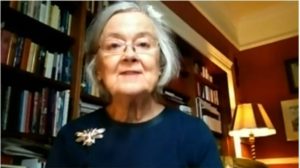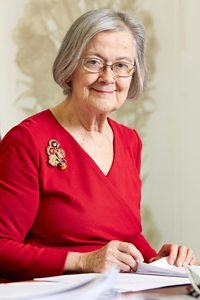 Despite the technical problems the presentation of Lady Hale was thought provoking and educational about the position of Women in Law.
Despite the technical problems the presentation of Lady Hale was thought provoking and educational about the position of Women in Law.
She began with the changes in the 100 years since The Sex Disqualification Removal Act of 1919 became law.
There were women applying to be lawyers before the act, in 1903 applications were made to the bar in London, in 1904 Christabel Pankhurst applied to join the Law Society, but none were successful as the word ‘person’ in the laws was found not to apply to women!.
It wasn’t until 1929 that definition of ‘persons’ was found to include women.
The 1st women lawyers were admitted in 1921 in Scotland and Ireland and in England in 1922. The first barrister in England was admitted in 1922 and in Scotland Margaret Kidd became a Scottish Advocate in 1923 but remained the only one for 25 years.
The attitude to the women was not good though, the misogyny faced was severe, and one barrister was described as large and blousy, incredibly common and even vulgar.
In 2004 when Lady Hale joined the House of Lords as the first woman Lord Appeal in Ordinary it was said by one of the existing Lords “Brenda will be a source of some anxiety until we adjust to the very different contribution she will make”. Have things ever changed?
Statistics!
In 1960 2.3% of practising solicitors and 4.4% of barristers were women. In 2017 the corresponding figures were 62% and about 50% and are now 52% and 38%.
The problem in Lady Hale’s view is one of attrition, especially with family responsibilities for women, which seem to increase as women move up in their profession.
Women solicitors as partners in private practice now number about 1/3, and for barristers women QC ‘s number about 17 %.
For the Judiciary, the first woman Judge was appointed in 1945. Rose Heilbron, a keen Soroptimist, became one of the first women to become King’s Counsel and then Queen’s Counsel, and was the second woman to be appointed High Court Judge.
continuing on to Lady Hale’s appointment in 2004 so women now sit at every level of the Judiciary. Currently women make up 32% of judges in the lower courts, 28% in the High Court and 21% in the Court of Appeal.
Lady Hale then posed the question as to why we should want more women in the Law.
For her, it is important that the law must serve everyone in society, all must feel confident they will get a fair hearing, and for this, both Courts and lawyers must be as reflective as possible of the society they serve. We must remember that women are not a minority group.
In addition the 3 guiding principles of the law are justice, fairness and equality, and race and gender should not affect these. Young people should see role models who look like themselves and we must not waste talents open to us.
Finally, If women are included ‘around the table’ it would be much less easy for men to voice sexist views, and if they do, it is easier for women to call them out. For Lady Hale we need women in the law to educate the men.
To conclude Lady Hale urged us to celebrate the achievements of women in the law up to now, but also to continue to fight to increase the numbers of women in the law and their worthwhile contributions.
A great way to start the Conference.
Louise Parry
SI Northwich & District
 Lady Hale is the most senior judge in the United Kingdom. After teaching law at the University of Manchester for 18 years and then proposing reforms to the law at the Law Commission for over nine, she became a High Court Judge in 1994. In 1999 she was promoted to the Court of Appeal and in 2004 to the appellate committee of the House of Lords.
Lady Hale is the most senior judge in the United Kingdom. After teaching law at the University of Manchester for 18 years and then proposing reforms to the law at the Law Commission for over nine, she became a High Court Judge in 1994. In 1999 she was promoted to the Court of Appeal and in 2004 to the appellate committee of the House of Lords.
In 2009, this became the Supreme Court of the United Kingdom. She was appointed its Deputy President in 2013 and its first woman President in 2017. She is also President of the United Kingdom Association of Women Judges and a past President of the International Association of Women Judges. She was Treasurer of Gray’s Inn in 2017 and Master of the Company of Fellmongers of Richmond, North Yorkshire.
Lady Hale has been described (Times 29th September 2019) as : ‘One of the most powerful women in Britain, and certainly the most prominent wearer of brooches’. She defines feminism as ‘believing in equality, equality for women and the validity of women’s experience.’

